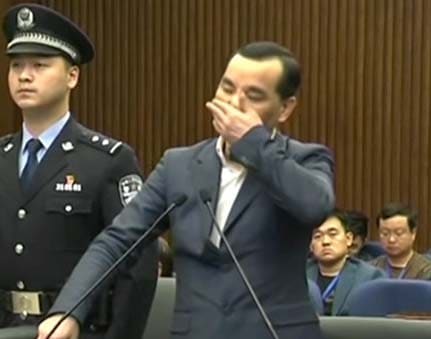
Wu Xiaohui was seen tearing up during his trial in Shanghai last week
China’s government is injecting RMB 60.8 billion ($9.67 billion) into Anbang Insurance Group after the embattled insurer was taken over by the insurance regulator in February and its chairman put on trial on fraud charges last week.
The newly merged banking and insurance regulator, China Banking and Insurance Regulatory Commission (CBIRC), approved the capital injection from the China Insurance Security Fund (CISF) on March 28, according to a statement on its website Wednesday.
The financial regulator said that the move aims to protect the interests of Anbang’s policyholders, as well as to ensure the solvency and stable operations of the Chinese insurer which first became famous for its $1.95 billion acquisition of New York’s Waldorf Astoria and later infamous for financial practices that are now the subject of a criminal case.
Anbang Bailout Could Cost Another $45B
“Basically [the move is to] make sure the company remains stable. If the company becomes insolvent, there will be bigger financial problems,” said Christopher Balding, professor at HSBC Business School of Peking University in Shenzhen during a phone interview with Mingtiandi.
Balding believes the $9.7 billion injection is just the beginning. “The injection today accounts for only around 1.5 percent of the company’s assets. It will not be surprising to see the government injecting 10 to 15 percent of Anbang’s assets, or RMB 2.5 trillion ($45 billion) more if you are talking about a company that has $300 billion in assets.”
The move comes after the insurance regulator seized control of Anbang in February for a year, saying that the insurer’s business operations violate China’s insurance laws, which might “seriously endanger” the firm’s solvency.
Regulator Plans Future Sale of Anbang Shares

Christopher Balding expects the government to inject more cash into the troubled insurer
The money comes from the China Insurance Security Fund (CISF), a government-mandated industry bailout fund supported by the nation’s insurers. The fund had a balance of RMB 116 billion ($18.4 billion) as of January, its website shows. As part of the bailout plan, CISF will temporarily hold shares in Anbang while the troubled insurer is administered directly by a group of officials from the CBIRC. The plan calls for the CBIRC team to eventually transfer the shares to new stakeholders, the interim management group said in the statement on Anbang’s website.
The government appointed management team indicated that it will soon begin selecting Anbang’s new owners, giving priority to matching the insurer with “large-scale private investors with a strong capital position, distinct core business, sound investment philosophy and strong operational track record to participate in its equity restructuring.” Investors from the industries of pension insurance, healthcare and internet and technology are particularly welcomed, the workgroup added.
After the capital injection, the registered capital of Anbang Insurance Group remains at RMB 61.9 billion ($9.8 billion).
Wu Xiaohui Charged with $10.4 Billion Fraud
While Anbang is being bailed out by the government, the insurer’s founder and former chairman Wu Xiaohui was put on trial in Shanghai last week. Wu has been charged with fraud valued at $10.4 billion, and of embezzling $1.6 billion from the insurance company’s insurance premium income. The ex-chairman’s actions severely damaged the safety of investor capital and jeopardised national financial security, according to the prosecutor. Wu initially contested all the charges and later expressed remorse for his actions, according to a Financial Times account.
Best known abroad for its $1.95 billion acquisition of New York’s Waldorf Astoria from Blackstone’s Hilton Hotels in 2014, Anbang Insurance subsequently picked up a combined $16 billion of properties, insurance firms and other overseas assets in the span of 30 months.
Anbang first came under government scrutiny in March 2016 when the insurer lodged and then abruptly abandoned a $14 billion bid for US-based hospitality chain Starwood Hotels and Resorts. The insurance regulator was reported then to have opposed further overseas acquisition by the insurer, which was said to have already exceeded limits on foreign asset holdings.
Borrow at High Rates, Buy at High Prices, Then Go to Jail
The insurance bailout, and Wu’s criminal case may have been precipitated by Anbang’s practising of borrowing at high rates through sales of wealth management products, and then investing that cash into long-term lower-yielding assets, paying off earlier investors or funding Wu’s personal expenses.
In the case of wealth management products such as its “Anbang Win-Win #3,” the company sold a three-year product offering a 5.1 percent guaranteed payout. Proceeds from this and other offerings were then invested in trophy assets such as the Waldorf Astoria which had a reported investment yield of around 2.0 percent, according to property consultancy JLL.
Anbang ranks 139th on the Fortune Global 500 list and has amassed total assets of RMB 1.97 trillion ($310.85 billion).
Leave a Reply